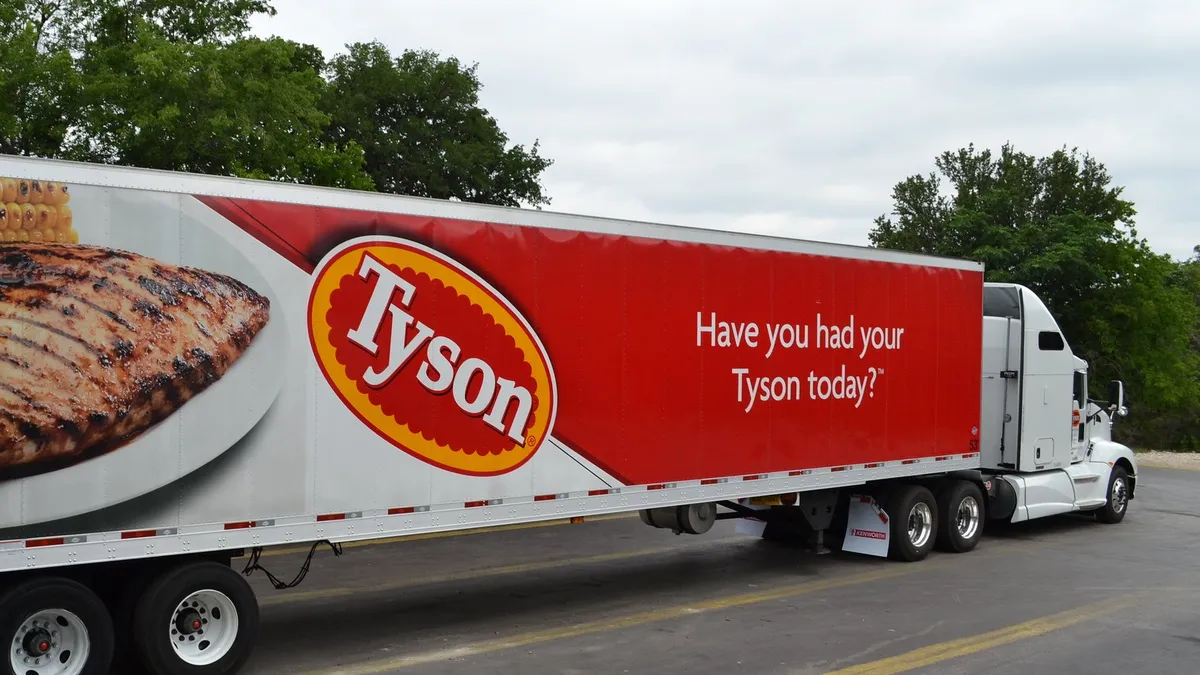Dive Brief:
- Tyson Foods has started to use FourKites visibility tools to examine detention and dwell time, Chris Plant, senior manager of customer service, said during a FourKites webinar last week.
- The real-time data also helps Tyson spot opportunities to address dwell time with carriers and customers, Plant said during the webinar, adding that the top commodity for carriers and their drivers is time. Data is helping Tyson assist carriers with time management and identify inefficiencies.
- "One thing we strive at Tyson, I'm sure a lot of other suppliers do the same, is to try to be a more shipper-friendly company — a shipper of choice, if you will, is something that we talk about a lot. How can we differentiate ourselves to our carrier base?" he said.
Dive Insight:
Dwell is out of the trucker's control. But Tyson, being a shipper and a carrier, has incentive to look at the time-consuming phenomenon from both angles.
The company has just started using data to examine dwell, a spokesperson said via email. So far, Tyson has been able to identify its highest dwell times by facility — its own and those belonging to customers — and has used that data to consider making changes.
Those actions could include drop trailer programs, adjusting days of the week on which shipments and deliveries fall, and adjusting volume on days, "when it makes sense and doesn’t impact order fill," the spokesperson said.
Grocery Outlet is also looking to leverage inbound and outbound data from FourKites to reduce dwell. Ultimately, the company would like for its warehouse inbound team to make adjustments in real time, Corporate Director for Transportation and Third-Party Logistics Adrian Santos said during the webinar.
Like Tyson, Santos said data on inbound freight can help the company move appointments throughout the day, staying "nimble" in the warehouse. And increased visibility will allow Grocery Outlet to spread out intake more evenly, bringing in more loads on days when there is usually less volume, for example.
"I envision us ... looking at the same set of data in real time, and also collecting the same type of data, so collectively we can really partner with the carrier community, in terms of benchmarking and defining really what good looks like," Santos said.
Tyson's freight costs have been going up, "largely due to a shortage of drivers," CFO Stewart Glendinning said on the company's earnings call this month. Reducing dwell time could be an important piece of retaining drivers. A lane with high dwell times could cause turnover.
In the first half of 2020, WorkHound research showed drivers expressed concerns over logistical issues, which included dwell and detention times.
"Drivers are looking for support in all areas ... in logistics that ensure that all facets of their work are lined up properly," according to a WorkHound blog post from July. "If they feel forgotten or unsupported, drivers are at a higher risk for turnover," CEO and Co-Founder Max Farrell said in the post.











